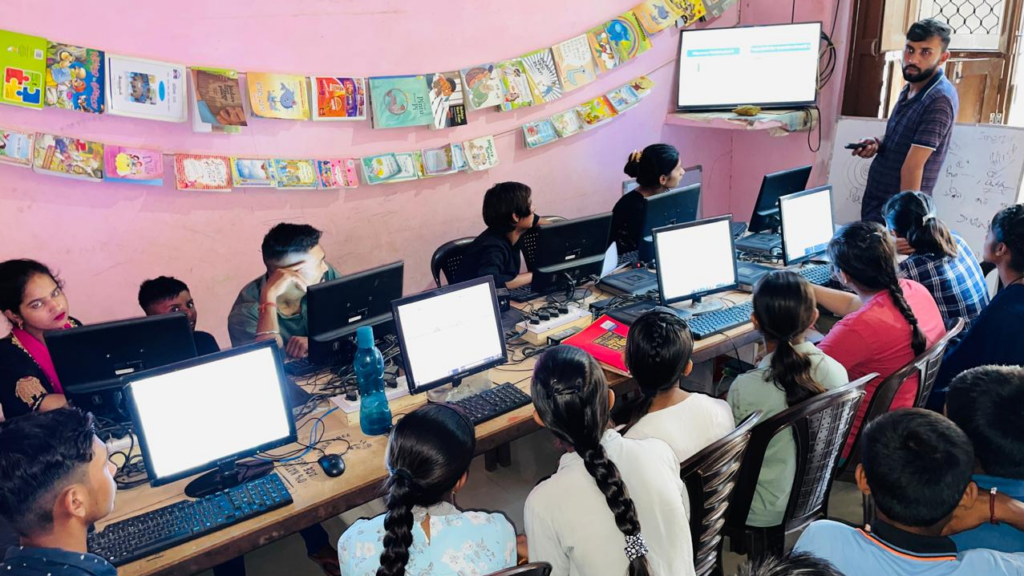How a rural learning pod transformed education in Purkhas Rathi?

In the village of Purkhas Rathi, a dream has come to life. A dream of giving every child a chance to learn and grow, no matter what. Mr. Kapil Jangra saw a future where kids here could have the same opportunities as any other child.And with the support of LIFI and Apni Pathshala, he began a journey to make that dream real. What started as a small initiative has now become a powerful learning space, where kids don’t just learn—they lead, they grow, and they build a future for themselves! This is the story of transformation in Purkhas Rathi, where you’ll see how hope and courage can write a whole new chapter. The Vision: A new era of learning for Purkhas Rathi In 2020, Kapil Jangra joined Learning Initiatives for India (LIFI), where his work was just to teach students from Class 1 to 5. During his fellowship, he quickly realised that while children were receiving basic education, there would be a great gap once they finished their fifth standard. The lack of a computer lab, essential learning tools, and opportunities for further education in the village made him ask one simple question—What happens to these kids after they finish school? Kapil was determined to find a way to give the children of Purkhas Rathi the skills they’d need for a brighter future. His vision? A computer lab, right in the heart of the village, where kids could learn essential skills to help them succeed in today’s world. But, like many dreams, it seemed impossible at first as he didn’t have the money or resources to make it happen. Still, the man had no plans to give up. He started talking to people, surveying the community to understand their needs and gather support. He even approached the village leader, the Sarpanch, to get support for his idea. Soon, the community started joining. Some donated money, while others brought books, chairs, or furniture—whatever they could offer to help turn Kapil’s vision into a reality. Overcoming challenges with determination You can’t expect to reach greatness without facing any challenge. The road to establishing the learning pod was anything but simple and smooth. Kapil faced numerous challenges, both practical and emotional. As someone with no prior experience in managing such projects, he felt hesitant and unsure, especially when it came to asking for financial help. “Sometimes, doors were slammed in our faces. People doubted us, mistreated us, and I won’t lie, there were moments I felt like crying,” Kapil recalls. But the fire in his heart never extinguished! One of the biggest challenges was the lack of electricity. For months, the learning pod had no reliable power, making it challenging to create a proper study environment. “We had to use lamps and even incense sticks to make the space usable for the kids,” Kapil shared. Even the internet was a struggle as the Wi-Fi barely worked for six months. But despite these obstacles, Kapil and the kids kept going, fully committed to their mission. Another emotional challenge was convincing some parents to send their children, especially girls, to the pod. In a village where education for girls was often considered unnecessary beyond the age of 12, Kapil fought hard to change mindsets. “Meenakshi and Sakshi’s parents initially refused to send them,” says Kapil, remembering the struggle. “Meenakshi’s father was a police officer and wanted to marry her off. But I didn’t give up. I spoke to him again and again, showing him the value of education, and eventually, he agreed.” Meeting Apni Pathshala Where there’s a will, there’s a way. Thanks to Mr. Raman Bhal, the founder of LIFI, Mr. Jangra came into contact with Apni Pathshala: an organisation dedicated to providing quality education and life skills to underprivileged communities. Apni Pathshala’s support was the turning point for the learning pod at Purphas Rathi. They provided computers, electricity, Wi-Fi, and ensured the cleanliness and maintenance of the space. With their support, Kapil’s dream was no longer a distant hope, but a reality. “Apni Pathshala is not just an organisation; they are the backbone of the learning pod,” says Kapil. “They understood our vision and stood by us, providing the resources we desperately needed.” A Pod Managed by the Kids The most amazing part of the learning pod is how self-sustaining it has become. What started as Kapil’s initiative has turned into a space where the kids not only learn but also run things on their own. They’re in charge: creating study schedules, managing computers, and planning activities. “The kids are the true heroes here,” Kapil says proudly. “When I’m away for seminars or training, they handle everything from making study plans, taking photos to even guiding new students. Watching them step up as leaders is incredibly heartwarming.” This sense of ownership is deeply rooted in the students. “When I have to leave, they tell me- ‘Sir, you go, we’ll take care of the pod,’” Kapil shares with a proud smile. “And they don’t just manage it, they’ve made it their own. They take initiative, help each other, and genuinely care about making the pod a place where everyone can grow.” Isn’t this what success looks like? Routine and Growth: Learning Beyond Books The learning pod operates every evening from 5 PM to 7 PM, with a specific no. of students attending each session. On Saturdays, they focus on games and extracurricular activities like dance, singing, and sports to keep the children entertained and teach them life skills such as teamwork. On Sundays, the pod is open for revision and catch-up sessions. The kids themselves decided to contribute a small fee of 300 rupees per month to help cover the expenses for electricity, Wi-Fi, and rent. “They’re incredibly thoughtful,” says Kapil. “These kids are already learning the value of responsibility and self-sufficiency at such a young age.” Looking forward, Kapil hopes to add an English-speaking course to the curriculum to ensure the children aren’t left behind just due to language barriers. “I’ve faced
